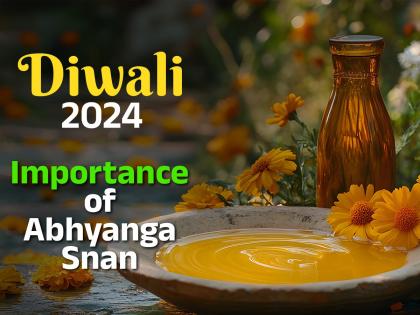Diwali 2024 Abhyanga Snan: Time, Shubh Muhurat, Significance & Essential Details on This Maharashtra Bathing Ritual
By Lokmat English Desk | Updated: October 28, 2024 19:24 IST2024-10-28T17:47:48+5:302024-10-28T19:24:27+5:30
As Diwali approaches, the festival celebrated across India takes on various cultural meanings. One of the significant rituals observed ...

Diwali 2024 Abhyanga Snan: Time, Shubh Muhurat, Significance & Essential Details on This Maharashtra Bathing Ritual
As Diwali approaches, the festival celebrated across India takes on various cultural meanings. One of the significant rituals observed in Maharashtra is Abhyanga-Snana, an auspicious ceremonial bath performed before sunrise on Naraka Chaturdashi, the second day of Diwali.
The ritual signifies physical and spiritual cleansing, marking the triumph of good over evil. Traditionally rooted in Ayurveda and Hindu history, Abhyanga means "massaging," and Snana translates to "bathing." The practice involves a cleansing bath following a deep oil massage, believed to rejuvenate the spirit and purify the body.
This year, Abhyanga Snan will be observed on October 31. The auspicious time, or muhurat, for Abhyanga Snan will be from 5:19 AM to 6:32 AM, which is 1 hour and 13 minutes long
The ritual typically includes a warm oil massage or the application of ubtan, a herbal paste made from turmeric, sandalwood, gram flour, and rose water. The massage is performed in circular motions, starting from the head and moving downward, to stimulate blood circulation and relax muscles.
Read Also | Diwali 2024 Dates and Shubh Muhurat: Dhanteras, Lakshmi Pujan, Choti Diwali, Bhai Dooj – Know Complete List of All Festivities
After the massage, participants take a warm water bath, often enhanced with rose or sandalwood essence. This is followed by wearing new, vibrant clothes, which symbolises a fresh beginning. The ritual concludes with applying a subtle fragrance and offering prayers to the sacred Tulsi plant and Lord Krishna, inviting protection and prosperity.
While many people purchase a variety of soaps, perfumes, and pre-made ubtans (a paste of various powders and liquids used for bathing) for the traditional Diwali oil bath, or Abhyanga-Snana, experts recommend using natural ingredients.
As winter approaches during Diwali, skin can become dry, so natural ingredients like black sesame, amla, sesame or coconut oil, and milk are recommended, as they are highly beneficial for the skin.
Beyond its spiritual significance, abhyanga snan offers numerous health benefits, including improved skin health, stronger muscles, and overall well-being. Ayurvedic practitioners recommend practicing this ritual regularly throughout the year.
Read Also | New Rangoli Designs for Diwali 2024: Easy, Simple, and Beautiful Rangoli Design Images To Make the 'Festival of Lights' Beautiful and Colourful
Open in app